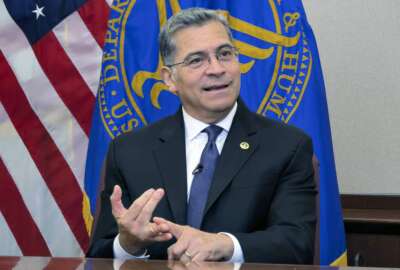Disability claims backlog, EHR efforts top VA nominee’s priorities
At his nomination hearing before a Senate committee Tuesday, President Barack Obama's pick to serve in the Veterans Affairs Department's No. 2 management...
At his nomination hearing before a Senate committee Tuesday, President Barack Obama’s pick to serve in the Veterans Affairs Department’s No. 2 management slot pledged to tackle a host of challenges plaguing the department.
Sloan Gibson, the president and CEO of the nonprofit USO, told members of the Senate Veterans Affairs Committee if confirmed to be the VA’s deputy director he would tackle the longstanding backlog of disability claims and will work to find common ground with the Defense Department on a new strategy for a joint electronic-health records system.
Gibson, a former U.S. Army infantry officer and banking executive, said his private-sector experience has helped prepare him to serve as the chief operating officer of the second largest federal agency.
“My business experience in both for-profit and not-for-profit sectors provides a strong background for this role,” Gibson testified before the committee. “The discipline and accountability of regularly meeting a bottom line and delivering results that meet the expectations of a range of stakeholders has built the skills and knowledge I would bring to discharging these responsibilities.”
Former Deputy Director Scott Gould left the agency in May amid an exit of several top VA executives, including the department’s chief of staff and chief information officer.
Meanwhile, the agency has faced continued blowback from lawmakers, veterans and advocacy groups over the substantial backlog in disability cases and the glacial pace with which decisions on disability cases are rendered by the Board of Veterans Appeals.
“The bottom line is you have a huge bureaucracy, a very large budget,” Sen. Bernie Sanders (I-Vt.) said in his opening statement. “I think the average veteran in this country believes the VA is doing a good job in terms of health care, at least. But we can do better.”
VA has seen success — shrinking the backlog by more than 200,000 claims over the past eight months, Gibson testified. The backlog currently stands at 400,000, of which about 60 percent are supplemental claims, meaning veterans have already applied for benefits and are returning to request additional benefits.
But he acknowledged that more work needs to be done.
“No one’s happy with where things are right now,” he said. “No one’s satisfied. Where we are in terms of timeliness is not acceptable. But I think there’s some exceptional work going on right now designed to permanently eradicate the claims backlog. The innovative work to integrate investments in people, process and technology, I think, are exactly the right things to do.”
Gibson also said he wouldn’t remain holed up at VA headquarters but planned to meet with both veterans and rank-and-file VA employees.
“If confirmed, I look forward to going out and talking with veterans who have recent claims experience … talking with front-line staff who are actually doing the work of processing claims day in and day out,” he said.
If confirmed, Gibson would also be expected to take the lead in managing VA’s interactions with the Defense Department. That relationship has been the source of much consternation, in part, owing to the two departments’ rocky path toward developing a joint integrated electronic-health records (i-EHR) system.
DoD and VA scaled back plans in February for a single core technology to power the EHR system. Instead, the two departments will continue to work on separate systems but focus on better integration of health data.
Sanders criticized that move, saying the two departments spent years preparing for the new system, “with very little to show for it, except maybe spending hundreds of millions of dollars and no one is quite sure where that money has gone,” he said.
Gibson said engineering a seamless transition between between DoD and VA medical benefits for transitioning service members would be among his top priorities.
“I would expect that to be a focal point for a lot of the interaction with DoD and the work on the integrated electronic health record (i-EHR), and I would look forward to wading into that space with vigor,” he said.
Policy nominee also wants to revisit joint EHR effort
Revamping the department’s EHR efforts are also a top priority for Linda Schwartz, who was nominated by Obama to serve as the assistant VA secretary for policy and planning.
The concept of a seamless medical record bound by a common technological platform shared by DoD and VA is “definitely worth revisiting and taking a look at why did it fail?” Schwartz told senators at her nomination hearing. “I’m not really sure I know the reason why it failed, but I am vitally interested in seeing what happened and how we can make it work because it is the answer.”
For Schwartz, currently the commissioner of Veterans Affairs for the state of Connecticut, improving medical benefits for veterans is not just a policy initiative — it’s personal.
She has drawn on VA benefits since 1986 when she retired from the Air Force after being injured in an aircraft accident while serving as a flight nurse.
“It took three years from the time of my accident before I even went for care at the VA. … I was medically retired from the United States Air Force, and the VA had no idea of who I was or where I was,” Schwartz said. “And I had no idea of where VA was.”
The committee also considered the nomination of Constance Tobias to serve as the chair of VA’s Board of Veterans’ Appeals. Sanders called it one of the toughest jobs at VA because of the level of frustration veterans have with VA’s disability claims system and amount of time it takes the board to reach a decision.
The board’s caseload is set to grow larger. VA estimates about 45,000 veterans will appeal disability-claims decisions during the next fiscal year, according to Sanders, who cited VA budget materials. Meanwhile, the time it takes to resolve an appeal takes an average of 866 days, according to Sanders.
Tobias, currently the chair of the Health and Human Services Department’s appeals board, pledged she would provide lawmakers within her first 45 days on the job a plan for reducing the time it takes to issue a decision.
RELATED STORIES:
House committee worried DoD, VA ‘moving the goal posts’ on e-health records
VA Deputy Secretary Scott Gould leaving
DoD, VA accelerate schedule for integrated health record
Copyright © 2025 Federal News Network. All rights reserved. This website is not intended for users located within the European Economic Area.





